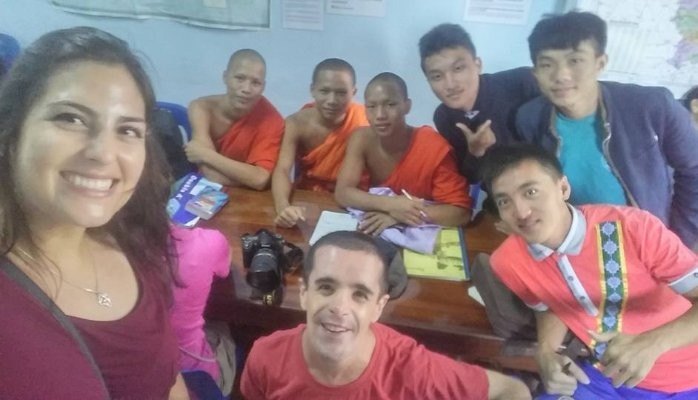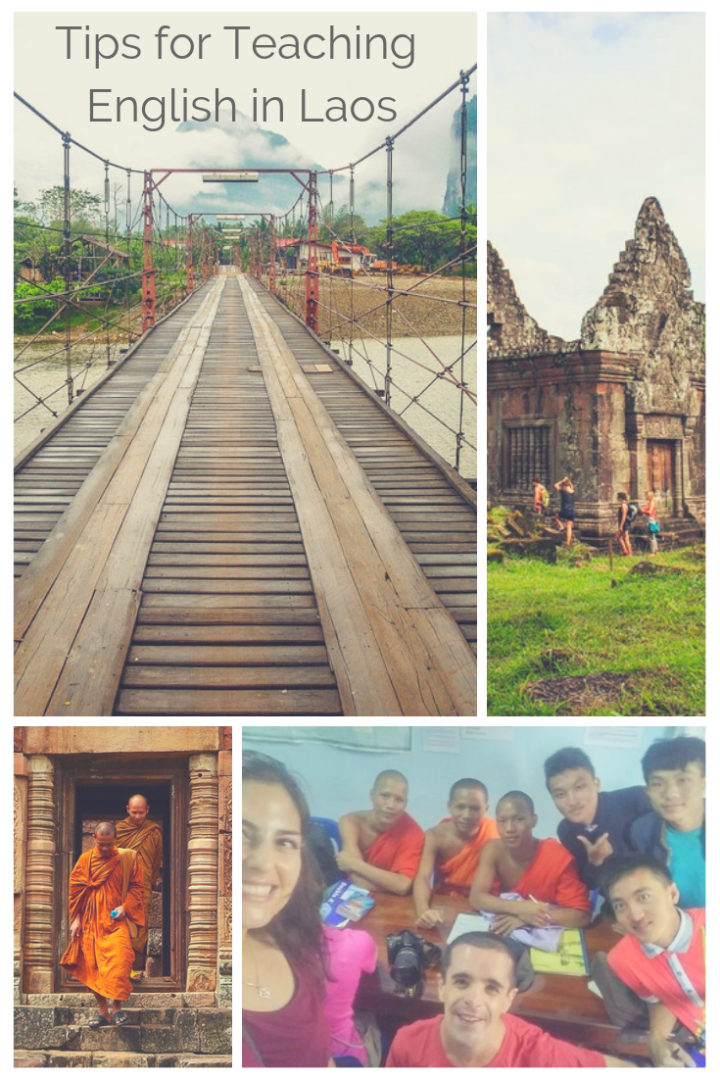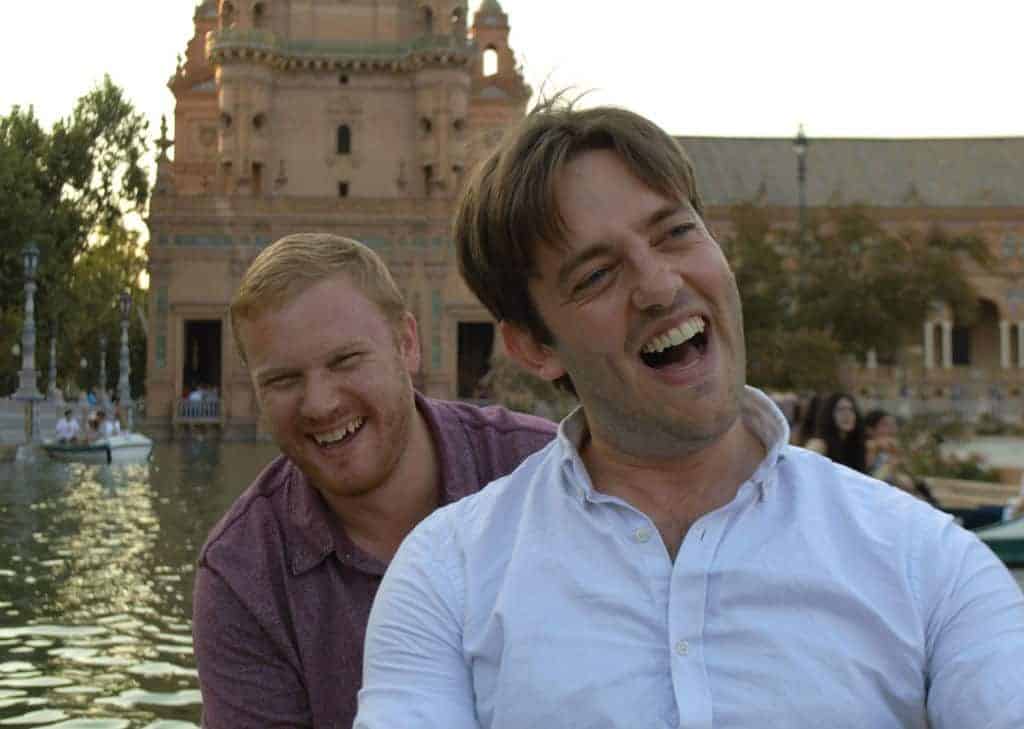Nestled in the center of Luang Prabang, Laos, there is a school there called Big Brother Little Mouse. And in this little tiny school, it’s almost kind of like a hole-in-the-wall establishment where many of the townspeople congregate and go to practice their English. And when you first visit this unassuming place, you are intrigued by it because there are so many shoes outside and bikes parked near the entrance. And it just is a very busy crowded place that has a lot going on.
Laos isn’t one of the most developed countries in the world, and English in Laos is still very much appreciated, however little resources they may have to budget for services to teach English. In small towns, like Luang Prabang, you’re not really going to see that many offers or that many institutionalized programs for teaching English and learning English. So, Big Brother Little Mouse is kind of the big fish in a small pond, so to speak, at least in this city.
Teaching English at Big Brother Mouse in Laos

When you first enter though, it’s just kind of like a very narrow railroad-style school where there are people all around engaged in various kinds of self-taught and taught classes in English. There are students reading books, and then there are other students who are studying with a guest teacher there.
As a Laotian citizen, you can just walk right in and start taking these classes while as an English-speaking foreigner, you can just walk right in and start teaching—no CELTA, TEFL, or history of teaching required! It’s totally voluntary and unlike other countries, appreciated! So there are no checkpoints which can be scary too! But moving right along!
If you were around to see 1950s America when there were actually opportunities, well this is it folks. The land of opportunity is now Laos!
All you do is you sign a little notebook that says you’re signing in and filling in for about an hour or so, or however long you want to stay, and then you just start meeting the students there and engaging them in conversation. Poof! You’ve become a certified teacher in Laos! Life really doesn’t get any better than this! It is true on the job training. Seems too easy right?
And get this, many of the students are actually monks at the local temple. So they have to be extra nice to you, beyond Starbucks-level nice. Like Costco level nice. Kinda creepy.
You’re basically teaching English to saints, the absolute best kind of student, let me tell you. Aside from the military students, these guys are almost perfect.
Living Alongside the Monks
Monks are very prominent figures in Laos. Generally speaking though, there are just many students in this school who are trying to learn enough English so that they can be able to secure better-paying jobs in their own towns because a lot of those good jobs that are in these small villages or cities demand English for the tourist economy that’s growing in these countries. Because a lot of the economy is supported by tourists, English is a needed skill for ensuring that quality service is rendered so that money is exchanged. Many people in developed countries take this for granted, they think that money just passes across the table of its own volition, but actually there’s an element of pleasing people that we often forget about until we visit a city like Luang Prabang where splitting hair differences in customer service make or break entire businesses and where hiring the most qualified fluent English speakers is a necessity. Which is why we choose to speak to someone from Iowa over someone from India.

It’s very true that you just walking into Big Brother Little Mouse provides an incredible service for these people. It gives them the time to try out their customer service on you. Sadly you can’t Yelp review them, but still five stars!
I find the same kind of similarity with Vietnam, in Danang, where a lot of the economy that runs Danang is also tourism because of the beach and the river and Hoi An village, and there are just a lot of different attractions here for people who like warm weather and just want to relax from the kind of hard work that they do in their home countries, in busy offices and cold weather. Many Koreans and Chinese visit Da Nang, wear those triangle hats as token foreigners will, and take pictures of themselves by the beach and the river. So Da Nang, like Luang Prabang, also demands tourism-English. Really every place needs English because Americans like to hear their native tongue. We’re selfish like that.
Starting Out in Laos as a Teacher
For those of you who are interested in possibly becoming English teachers overseas, but are afraid that you don’t have any experience, and you don’t want to pay a full 2000-3000 dollars for the TEFL course or the Celta course, maybe one of the best ways of getting your experience under your belt would be taking a nice extended vacation to Laos, in Luang Prabang, and teaching at the school there because they definitely need teachers all year round to help these students pass their exams and become fluent enough to serve the economy. Oh, you might have to make do without internet since the only really strong WiFi connection can be found at their one café, but you get the same level of experience that you would with any other endeavor, not to mention warm weather and great food! Which is a huge step up from teaching English is say New Jersey, even with the excellent wi-fi.
Now, you’re probably wondering how could someone who doesn’t speak Laotian, or any of the tribal languages, possibly teach English? And that is a very good question because it comes up a lot for people when they are considering becoming “English teachers,” in a foreign country, especially when they don’t speak the native languages.
We often forget that English is a necessity for almost everyone on the planet. News flash: It’s a world language, not just an American language. But only Americans expect everyone else to speak it, because, why not?

And the basic principle behind teaching English as a Foreign language—i.e. you don’t know their language, you just speak English– is that you are basically immersing people in your own language and your own world. And when these people go into your own world, the theory goes, you can get them more reliant on using the English they already probably have and building from there (unless of course you’re teaching to a really obscure tribe that has never been touched by human civilization, but you’ll be hard pressed to find such tribes in this day and age. Even the Jururei tribe has already been discovered and has its own YouTube series). All the Amazon tribes, South Pole, Antarctic, Appalachian.
More Tips on Teaching English in Laos
If you can immerse people in your world of English speaking, and they can get consumed in it, then they will have a much better chance (or even just a practice session) than if they were just kind of reading the material from a book.
It’s one thing to have knowledge, but it’s another thing to have applied knowledge. Applying knowledge is knowledge that you actually are working at and doing until it becomes internalized in your body. Many of you who are practicing all sorts of professions, whether it be science or social science or something else entirely, will know how valuable first-hand practical experience can be in terms of internalizing the knowledge and information that you’re getting from books or from observing from a distance.
Another way of breaking this down is passive learning versus active learning. There’s only so much you can get from passive learning and just kind of consuming and getting a false sense of feeling like you’re accomplishing something than if you were to take that knowledge and start running with it and speaking with a native English speaker. Sometimes you really just have to do it. And that’s my plug for Nike this week.
At Big Brother Little Mouse, not only are there students there who are learning through passive ways: experiencing audio, watching YouTube and Facebook, and trying to immerse themselves that way. But when there’s actually a live English teacher in the room, then they really can get a chance of doing a real interactive session and without having to necessarily pay what an English teacher would cost for one of the more developed programs that you might see in Korea or the Middle East. They can try their hand at English and make sure they are really getting it right, at normal conversational speed.
Bet you didn’t realize you could be so helpful like this, just for knowing your native language! Who’s a loser now Dad?!
You’ll probably think it’s a sin for helping people just because you have this skill you’ve acquired just from winning a genetic lottery, but that’s the way life goes, kiddo. But by doing something like this you can alleviate some first world guilt.
 Don’t Worry About a Thing!
Don’t Worry About a Thing!
So there’s a lot that actually can be offered, even if you don’t speak the native language. In fact, many have argued quite persuasively in seminars and lectures that it actually is a disadvantage if you speak the native language because then you just fall back on that language, and then it just becomes a crutch, and then eventually you find yourself just kind of translating back and forth. And that’s not really serving the purpose of helping a person who wants to learn English really get immersed in the environment of an English speaker. The idea is to get the learner to literally morph from their native tongue to a completely different language, effortlessly and with a level of comfort and ease that they almost become different people right before your eyes! I’m not sure if you’ve ever witnessed this because there are so few people who actually manage to make this transition as an English learner, to go from fluent native language to fluent English.
Even medical professionals—supposedly the smartest of the human species—don’t make this transition. And they have way more education than most of us mere mortals!
When you witness this for the first time, trust me, you’ll take notice because the person literally looks totally different to you when they start speaking fluent English, perfect pronunciation and all. And if that doesn’t sell you on this idea then you are made of stone. It’s amazing to witness.
It kind of makes you wonder what your girlfriend who barely speaks any English really thinks about you and what she would really say to you if she were barely able to form full sentences. On second thought you rather not know and live blissful ignorance.
It’s one level of fluency where you are speaking English, broken English, and reverting back to your native language back and forth, where communication can sometimes get lost, versus another level of English that is entirely fluent where the pronunciation is entirely perfect and you are basically becoming a different person. To achieve this, you don’t read books all day in an ivory tower and hope to achieve epiphanies you didn’t realize before. Get out there and talk away the day, which is contrary to what your teachers told you in school.
It has to be a total body experience. And this is kind of what English as a foreign language can offer to students. This immersive experience can provide that bodily experience of learning a language and internalizing it that passive ways of learning a language might not be able to afford.
Student Benefits and Rewards
So, Big Brother Little Mouse does offer that kind of immersion to the students, but alternatively, it also offers aspiring English teachers the experience that they need to improve their skills as a teacher, a teacher in the immersion game.

I would recommend that if you’re looking for the best type of immersive experience in teaching, in order to build up your credentials as a world traveler and seasoned educator, what better way than to spend some time in Laos and do some real needed service that will be genuinely appreciated. Big Brother Little Mouse does offer a lot in this regard!
Will you get the most money? No, probably not but you’ll get invaluable experience that you can take with you all over the world, and you’ll also make lifelong friends, some of whom might become Laotian supermodels. You’ll also develop some mystique which comes in handy when people seldom look outside themselves and wonder about you, another person. Trust me, only about 1% of humanity, other than your mother, is going to wonder about you and when opportunity meets preparation, this is when it’s going to count the most, plus you can’t put a cap on experience. But companies will, and it’s huge!
“Oh yes, I did spend some time in Laos, teaching monks who ended up working at Lockheed Martin.” Wow, just wow! Guess what you got the job! Take that MBA Steve!
And here’s another interesting little shocker for you.
When I was at Big Brother Little Mouse, it was just surprising to see how so many many of the monks there had cell phones and how many of them were on Facebook and YouTube! Seriously! I saw them doing all kinds of texting stuff that many Americans probably wouldn’t think monks would do. It was kind of surprising, kind of a culture shock for me.
And, of course, my scheming little mind was thinking of all sorts of ways we could capitalize, thinking “How can we turn a profit on this? Maybe we could have a monk YouTube channel, Monk QVC, and maybe we can have a monk calendar spread, a sort of premium, with monk magazines. Maybe we could do like a monk soap opera where a monk is chanting and then suddenly his girlfriend comes in but he’s not supposed to have a girlfriend.” You know, monetizing a rarity like a good capitalist.
All this even though monks don’t really care for money. But you know there’s always that one monk…yeah, every group has one. And he loves rap music too. Wu-Tang for life!
Teaching in Laos actually lets you see what’s going on in the world and you basically learn to just be out in the world and figure out what the heck is going on with people.
The world is changing rapidly and technology will change. Cultures and societies and beliefs and philosophies will change, so it behooves you to actually get out in the world and figuring out what the heck is going on so that you can profit from it, if you can. And with a little ingenuity and luck you totally can!
More Options for Teaching English in Asia
Anyway, if you want to learn how to teach and if you really want to teach schools of monks, Big Brother Little Mouse is one option. Certainly another option would be Thailand since both countries have a whole population of monks that require English.
Chiang Mai, in particular, has a program where you can actually teach monks. This would be another volunteer experience of course since monks don’t really take traveler’s checks or credit cards but you at least get the experience and a sense of how effective you are as a teacher to other human beings. And they will let you know if you suck. They may be saints but they are honest saints.
And more importantly, what you need to do to change yourself to try to be even more impactful, and even more influential and even more productive with the people that you take into your life. In short, profitable! Keep that American spirit alive!
Southeast Asia has plenty of monks to go around, and you could go to all of these different temples and try your hand at teaching English. You could even call yourself the Monk Whisperer. I’d watch that show!
I feel sort of like a carnival barker of monks right now, but it’s true. So step right up and teach!
And anyway, I really believe you can’t be an extensive traveler without having tried teaching English or helping people with English, at least once in your life. The experience of doing this I genuinely believe is fascinating and extremely fun, at least when you’re starting out and it feels like a fresh experience– no matter which country you visit or stay in.
So what are you waiting for? The monks are waiting! Book that ticket today!





























The Real Person Badge!
Thank you for this Todd Squitieri,
Within the next 3 weeks, I will be going to Vientiane, Laos for a month.
I thought I would try and knock on the doors of as many schools I could find and meet as many ESL teachers too.
I would be looking for schools that do not insist on a university degree.
I am willing to take the TESL course(s), if there are opportunities to be hired.
If Big Brother Little Mouse offers such opportunities that pays enough to feed me, I would jump at the chance.
I don’t require a big money job, just enough to pay for the cheapest bed and and a full belly.
Currently, I rent a bed for $30,000VND in Da Lat, Vietnam, so a similar priced bed or less would suffice.
You can look at my linkedIn profile, as a temporary CV(resume) and maybe you can assist me with who I should contact and where I should go.
Sincerely,
Eric Klyne
The Real Person Badge!
Hey Eric, thanks for reaching out! The author Todd would be the one to chat with, but I can’t find his site or socials online anymore, I’m sorry about that. You’re welcome to Google him and see if you can find more information. Good luck!